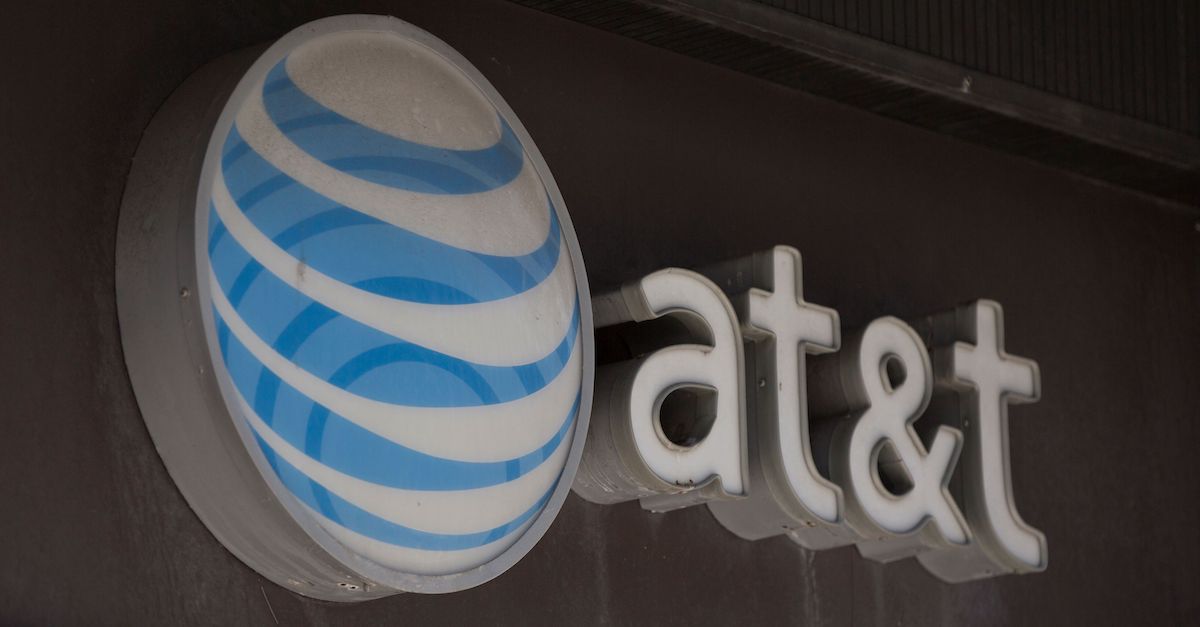
The AT&T logo is seen outside a building in Washington, D.C., on July 9, 2019. (Photo by Alastair Pike / AFP via Getty Images)
AT&T must stand trial on a “rare” type of enforcement action from the Securities and Exchange Commission accusing the telecommunications giant of selectively disclosing material non-public information to analysts at 20 Wall Street firms, a federal judge ruled.
Known as the SEC’s Regulation FD, a fair disclosure action bars a public company from selectively disclosing material nonpublic information to certain parties outside the company, unless it also discloses that information to the public.
The SEC sued AT&T and three members of its investor relations (IR) department — Christopher C. Womack, Kent D. Evans, and Michael J. Black — alleging that the they selectively disclosed material nonpublic information to the firms in April 2016, seeking to “manage” those analysts to reduce their estimates of the company’s first quarter total revenue in order to beat the consensus revenue estimate.
“AT&T had missed consensus revenue estimates in two of the three preceding quarters, and by March 2016, analysts’ consensus revenue estimate exceeded AT&T’s internal estimates by more than $1 billion,” U.S. District Judge Paul A. Engelmayer’s 129-page opinion and order summarizes, referring to the case as a “rare litigated enforcement action.”
According to the SEC, AT&T’s scheme succeeded, and the company exceeded analysts’ final consensus revenue estimate by 0.1 percent.
Judge Engelmayer denied motions for summary judgment filed by federal regulators and AT&T. On the facts of the case, Engelmayer said that there was “ample” and “overwhelming” evidence that the investor relations personnel revealed nonpublic data about the company’s performance to analysts, but the judge found that reasonable juries could find in either direction as to scienter, or intent or knowledge of wrongdoing.
“A jury could further find […] that the data disclosed was so clearly material, and so clearly nonpublic, that AT&T’s violation of Reg FD was open -and-shut, and that any trained IR professional at AT&T would clearly have appreciated this,” the opinion states. “That the calls disclosing the alleged MNPI were part of a systematic campaign initiated by AT&T — and not one-off, impromptu, or generally analyst initiated — could also be taken to support scienter.”
The same jury could also give the IR professionals the benefit of the doubt.
“On multiple grounds, a jury here could find this state of mind not established,” the opinion states. “Most obviously, the jury could credit defendants’ uniform testimony that, in real time, they had not appreciated that the information they were disclosing was material and nonpublic.”
“A jury could also note the absence of evidence that, in real time, any person within AT&T including the defendants or the supervisors who had instigated the campaign to lower consensus — raised an alarm or expressed any hesitation or reservation about the legality of the ongoing disclosures,” it continues later.
After scuttling both parties’ motions for summary judgment, Engelmayer wrote: “This case will now proceed toward trial, barring settlement.” The judge added that he would outline the next steps in a separate order.
AT&T and the SEC did not immediately respond to Law&Crime’s emails requesting comment.
Read the opinion, below: